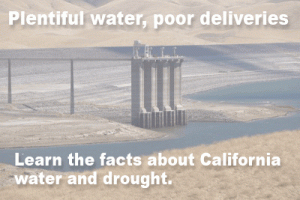(The following is a statement by Executive Director Jason Peltier of the San Luis & Delta-Mendota Water Authority on the end of the 2016 water year and a call for Congressional action to avoid a devastating repeat of 2016 Water Allocations)
The U.S. Bureau of Reclamation’s (Reclamation) diversion of water supplies
 from San Joaquin Valley farms to other uses has led to an unprecedented water supply imbalance and necessitates immediate state and federal government action to avoid a repeat of the problem in 2017, according to the San Luis & Delta-Mendota Water Authority.
from San Joaquin Valley farms to other uses has led to an unprecedented water supply imbalance and necessitates immediate state and federal government action to avoid a repeat of the problem in 2017, according to the San Luis & Delta-Mendota Water Authority.
“Reclamation will end this water year with over 4 million acre-feet of water in Northern California reservoirs and an IOU for over 300,000 acre-feet of water borrowed from individual farmers south of the Delta,” said Jason Peltier, executive director of the San Luis & Delta-Mendota Water Authority.
In 2016, federal fishery agencies mandated Reclamation severely cut water delivery to more than 2 million acres of farms in California’s San Joaquin Valley. Water quantities beyond reasonable estimates required for fishery protection have been held in Lake Shasta. About $340 million worth of water conserved or purchased by individual farmers was taken by Reclamation to help fulfill its contractual and statutory obligations to deliver water, leaving an estimated 340,000 acre-foot deficit in San Luis Reservoir that would normally be delivered to irrigate crops. This water has yet to be returned and, as a result, more than 50 water agencies are unlikely to receive a sufficient 2017 allocation irrespective of winter weather.
“The problem of chronic, regulatory water supply shortages used to be isolated to the Westside but in recent years has grown to affect more and more farms across the Valley, including now the CVP’s Friant Division,” Peltier added.
While federal fishery agencies have mismanaged much of California’s water supply in their attempt to protect threatened and endangered fish, populations of the protected species have continued to decline. State and federal agencies must change course to fulfill their responsibility to protect the environment and provide water supplies for the people who depend on them. Continuing the past quarter century of failed fish protection policy is unacceptable.
“Over the last nine years, we’ve been forced to make do with inadequate water supplies based on the multi-year drought and environmental restrictions. But having this year’s miniscule 5 percent allocation diverted to other entities as a result of poor planning and management underscores the need for immediate Congressional action to help guide the federal fishery agencies toward a more balanced outcome. It’s clear at this point that the people and communities served by the Central Valley Project are not a priority to the federal government and that the continuing regulatory drought is intolerable,” Peltier said.
Historically, constraints on Central Valley water allocations have been directly related to two factors: the need to hold water in Lake Shasta to ensure sufficient cold water is available to support salmon reproduction and the pumping restrictions imposed by the 2008 Delta smelt and 2009 salmon Biological Opinions. Since December of 2015, these restrictions have caused over 1 million acre-feet of water to flow to the ocean that was otherwise available for water users throughout most of California.
Federal water allocations are announced every year in the spring, based on snowpack and rainfall totals. Despite above average runoff into the Sacramento-San Joaquin Delta and near average snowpack in the northern Sierra Nevada this year, many farmers on the Westside were slated to receive only 5 percent of their normal allocation. While minimal, the allocation was an improvement on the zero percent allocation from 2014 and 2015. Based upon recent federal decisions, forecasts suggest that the 2017 water supply will be no better, irrespective of winter rainfall.
“Our assumption that Reclamation would proceed as promised, that water supply would return with rainfall, was wrong, and unless Congress acts, our cities, rural communities, and wetlands will continue to pay the price. Today we call upon our elected officials in the U.S. Senate and House, with the support of our California elected officials, to take action to guide the U.S. Bureau of Reclamation, U.S. Fish and Wildlife Service and the National Marine Fisheries Service toward better outcomes and provide farmers, cities, rural communities and wetlands with normal water allocations once again,” Peltier said.
###